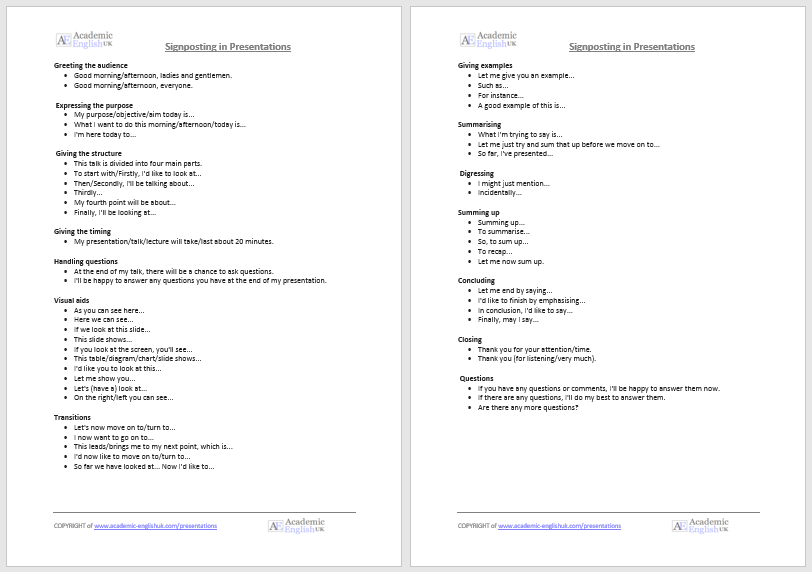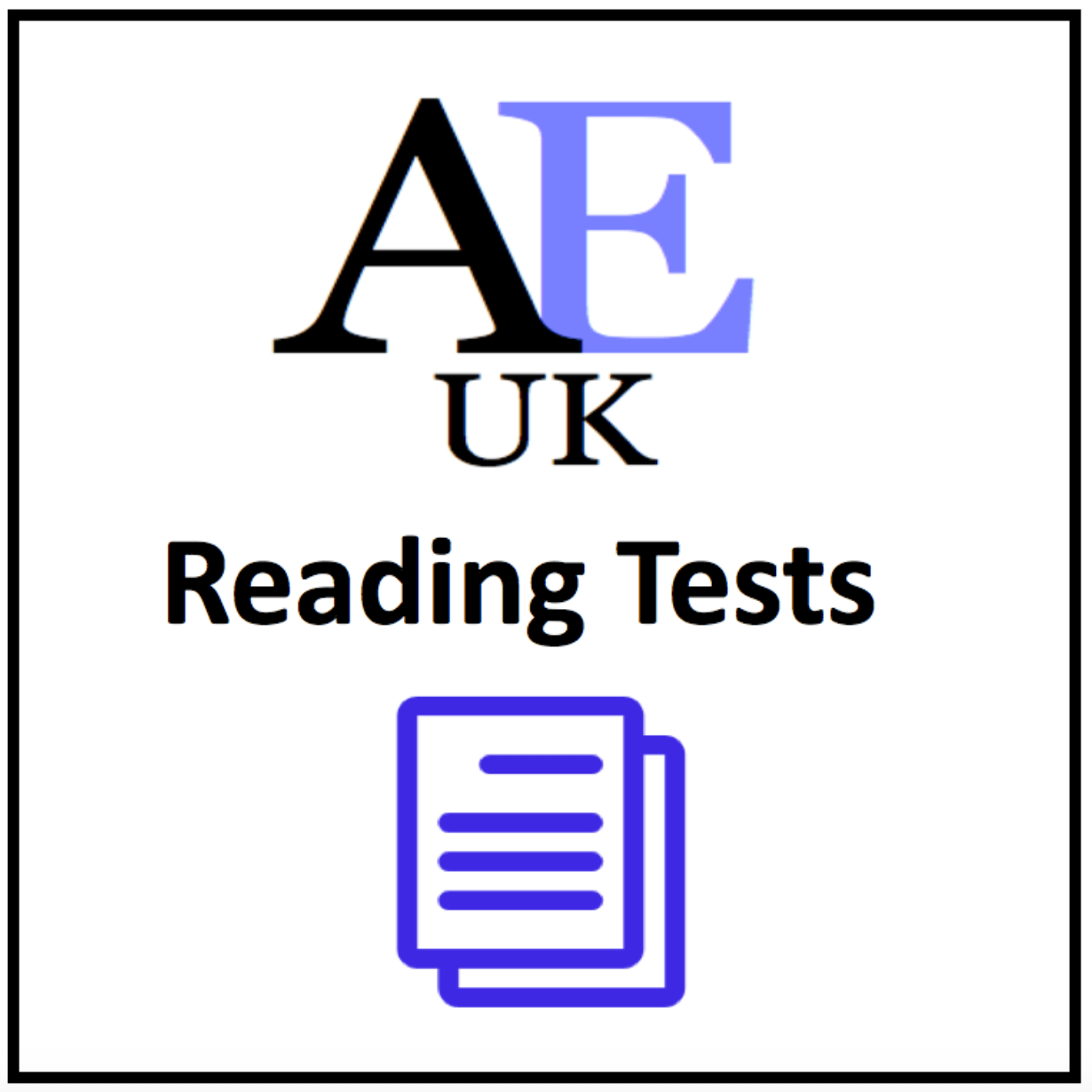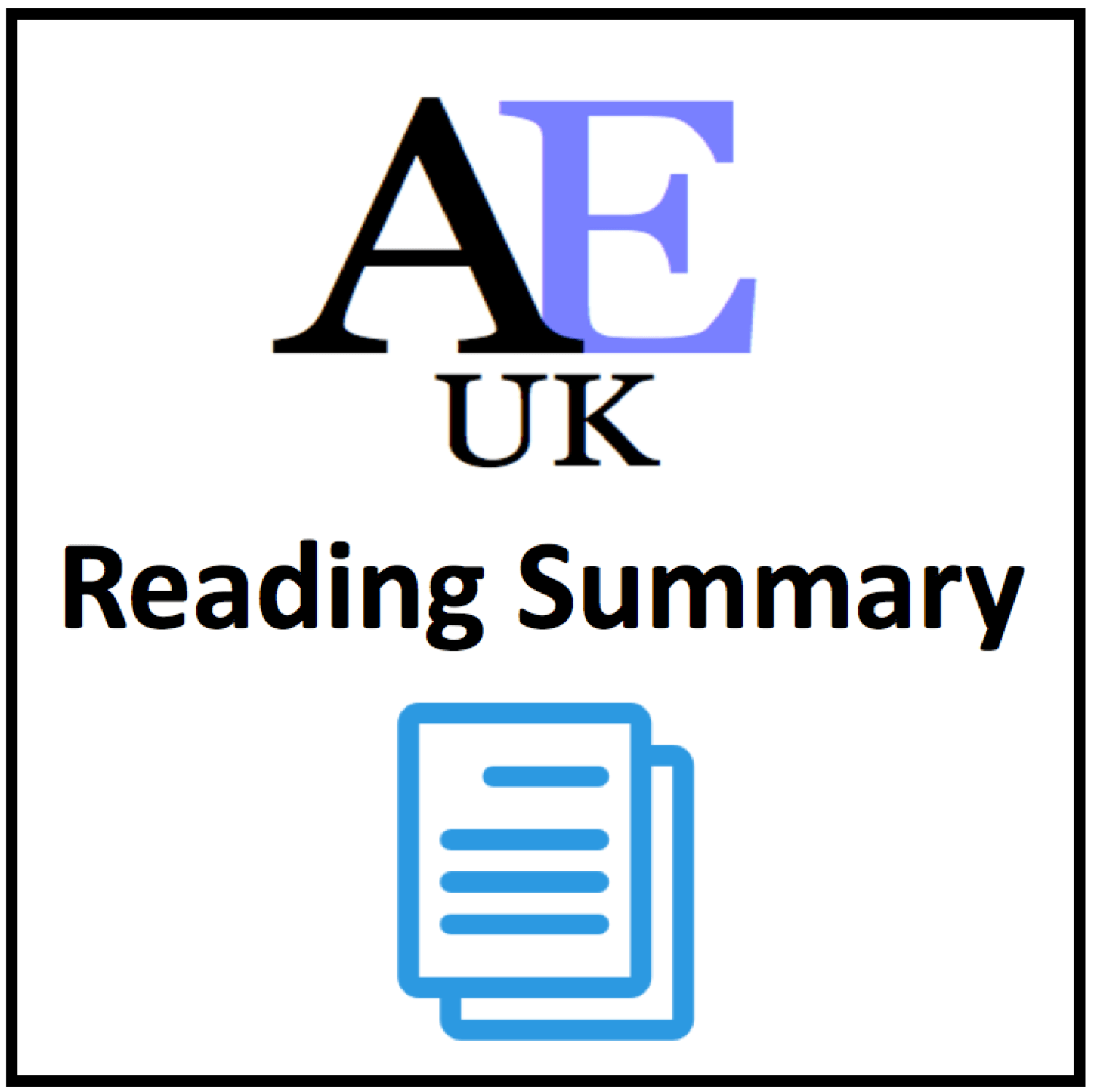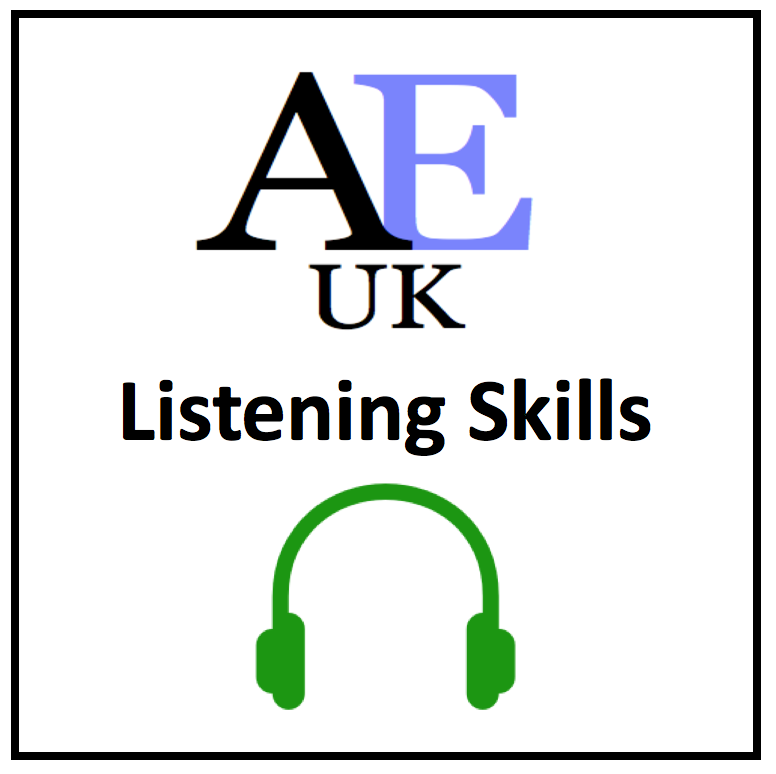Debates
Academic debating at university, debate phrases and key processes. Click here.
Presentations
Academic presentations, signposting language and delivery tips. Click here.
Seminars
Seminars are small group discussions. Seminar phrases and advice. Click here.
Academic Seminar Speaking
Seminar Listenings
Seminar Discussion 1
Seminar Discussion 2
Seminar Discussion 3
Marking Criteria
Speaking Tests
Speaking Tests x5 [new]
Seminar Lessons
Plagiarism [new]
Academic Integrity
Graphs and Charts
Learner Autonomy
Self-Assessment Questionnaires
Independent Learning
Reflective Student
What is a seminar?
What is a seminar?
Generally, it is a small discussion on a specific topic among a group of students. At university it can be a central part of the learning process from lecturers creating seminars around pre-reading texts or post-lecture discussions. Commonly, at university English language centres seminars have become a feature of testing English speaking though fluency, conversational skills and ability to discuss complex subjects.
Why have seminars?
- explore topics in more depth
- share ideas in a way that will advance your thinking
- learn from other people’s experiences and background knowledge
- improve transferable skills for career development
Pre-seminar Procedures
Students are often given pre-texts and pre-listenings before the seminar to prepare. Students are expected to read and listen to texts carefully by making detailed notes and come to the seminar fully prepared.
A Seminar Test
- Students work together in groups of 4-6
- Teachers provide a set of questions.
- Students discuss for 25-30 minutes (approx 5 mins per person)
- Students summarise the key points in the last 5 mins
- Students CAN refer to their texts and notes
- Teachers monitor and give feedback at the end.
The seminar process
- The group are called into a room and they sit around a table.
- The questions are given out and students have 2 minutes to read and prepare by taking notes.
- The seminar begins with an opening statement – we’re here today to discuss…
- The students then begin to discuss the first question.
- Each student should make a contribution by referring to their notes / texts.
- The seminar should flow with students adding to what was previously said.
- Once everyone agrees the question has been addressed in full, then they move onto the next question.
- Important: not all the questions have to be answered but they should be discussed in order.
- Once the students begin to approach 25 minutes, they should bring it to an end by each one summarising a main point raised.
key points to a seminar
- It should be a flowing conversation with everyone involved and contributing.
- The teacher / tutor should not intervene if it goes quiet but let the students manage the discussion.
- Students have to show confidence and demonstrate thorough awareness of the texts.
- Dominant students are penalised for not sharing and including others.
- Students should be penalised for just reading notes.
- Key debate phrases should be used to should conversation skills – agreeing, disagreeing, interrupting, etc…
 Seminar Speaking Criteria x2
Seminar Speaking Criteria x2
There is a basic seminar speaking criteria to assess seminar speaking skills which has four key criteria: Language accuracy, language range, pronunciation and communicative effectiveness. Also, another seminar criteria that includes ‘reference to materials’. Example / Level: ***** [B1/B2/C1] TEACHER MEMBERSHIP
Academic Presentation Speaking
Presentation Information
Academic Presentations
Presentation Phrases
What is an academic presentation?
Presentation PPT Slides
Improve your PPT slides
Create Effective PPT Slides
A Basic PPT Presentation
Graphs & Charts
Presentation Feedback
Marking Criteria
Teacher Feedback Form
Peer Feedback Form
Peer-to-Peer Feedback Form
Academic Presentation Information
Giving a good academic presentation
- Think about the aim of your presentation and what you want to achieve.
- Concentrate on your audience – who they are and what they (want to) know.
- Choose the topic that interests you – involvement and motivation are key to confidence.
- Give your presentation a clear and logical organization so that everyone can follow.
- Present information visually– this adds interest to your talk and makes it easier to follow
- Practise giving your presentation until you are familiar with the key points; this way you may discover any potential problems and check the timing. Besides, practice will also make you feel more confident.
Delivery
- Cope with nerves – breathe deeply; it calms you down and stops you from talking too quickly.
- Control your voice – speak clearly and try to sound interesting by changing intonation and rhythm.
- Watch your body language – try to give the impression that you are relaxed and confident.
- Maintain an eye contact with your audience – it keeps them interested in what you are saying. For this reason, you should not read.
- Provide visual information – but do not give too many facts at a time, give your audience enough time to take them in.
- Keep attention by asking questions which you are going to answer yourself.
Basic outline / structure
- Introduction – introduce the topic / some basic background / Thesis ( your stance or argument)
- Outline – provide basic bullet points on the key parts of the presentation
- Main body – divide the main body into sections
- Evaluation – always include evaluation. This can be a separate section or part of the main body.
- Conclusion – summarise key points, restate the thesis and make a recommendation / suggestion / prediction.
- Reference List – create one slide with all your sources
- Questions – be prepared to answer questions
Presentation Speaking Criteria
This is a basic criteria to assess presentation speaking skills. It has three key criteria: Language accuracy & language range, fluency & pronunciation, and presentation & engagement. Example / Level: ***** [B1/B2/C1] TEACHER MEMBERSHIP
Language Phrases…
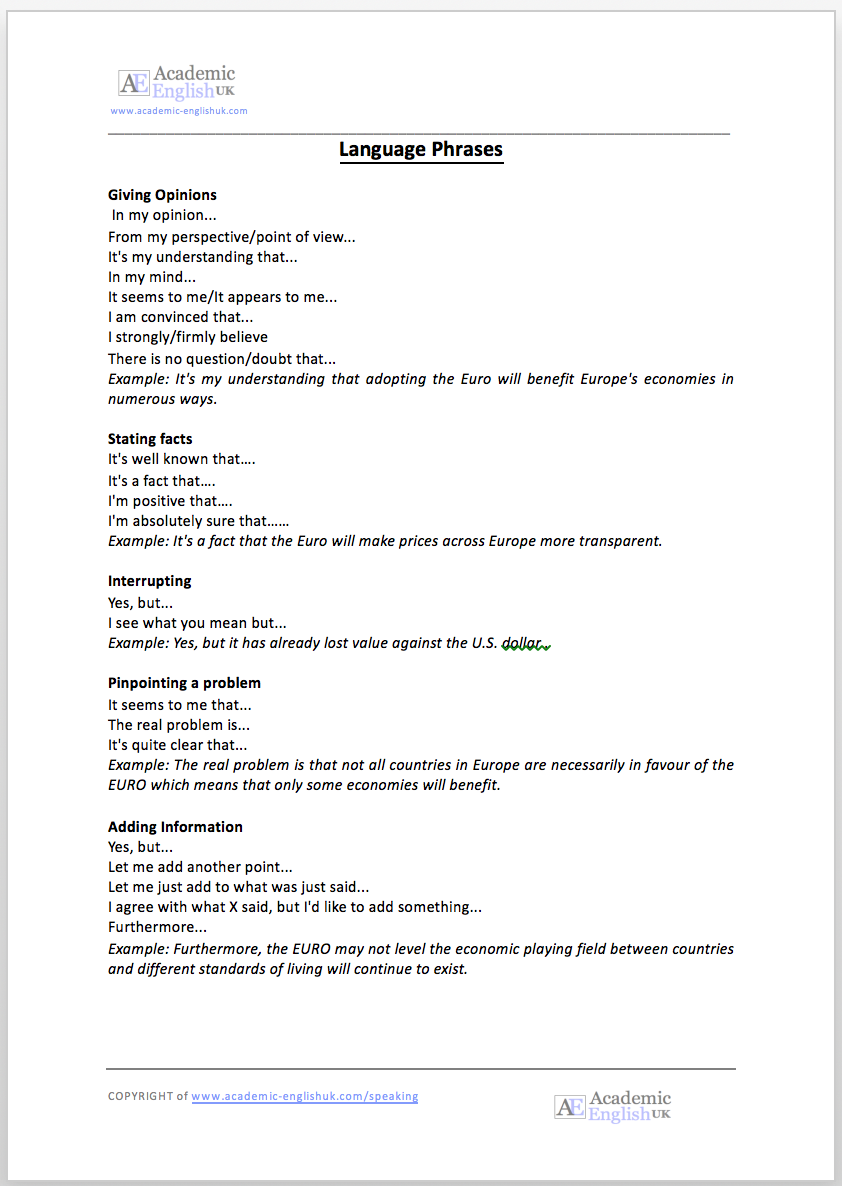
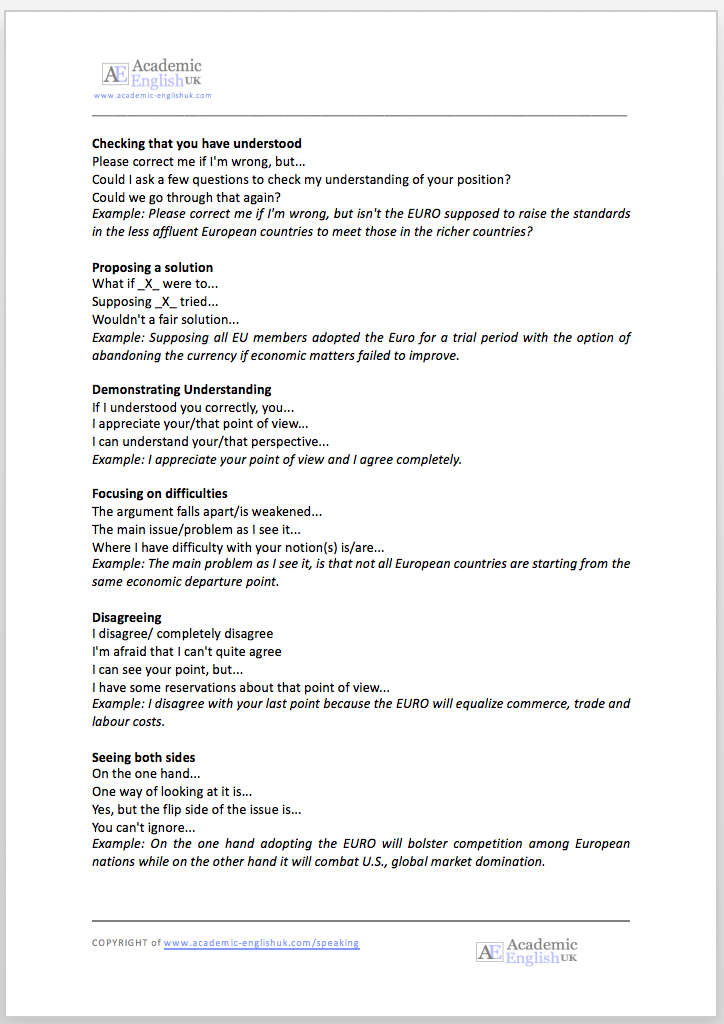
More Academic Resources…
Readings
online resources
Tests
online resources
Critical Thinking
online resources
New for 2024
online resources
Writing
online resources
Summary
online resources
Instant Lessons
online resources
Marking Criteria
online resources
Vocabulary
online resources
Argument
online resources
Topic-lessons
online resources
Feedback Forms
online resources
Listening
online resources
SPSE Essays
online resources
Medical English
online resources
AEUK The Blog
online resources
Speaking
online resources
Grammar
online resources
Charts & graphs
online resources
Free Resources
online resources
DropBox Files
Members only
OneDrive Files
Members only
6-Week Course
Members only
12-Week Course
Members only
EAP Teaching Resources: Academic Listening Lessons
Academic Speaking Lessons – Discussion Topics
Easy level
- What do you do to relax?
- Discuss…
- Relax on your own or with others?
- How do people in your country relax?
- Parents relax?
- Should people buy or rent houses?
- Discuss…
- Benefits and drawbacks
- Parents, friends, your future
- What is your favourite technology app?
- Why?
- How it works?
- Other apps that are important to you
Medium Level:
Education
What are the benefits of studying in another country in terms of quality of education, the cultural experience and future employment benefits?
Family
From the perspective of children, their parents and grand-parents, what are the advantages of all three generations living together in one house?
Transport
In terms of cost comfort and convenience, which is a better way to travel by car or train?
Hard level: More academic discussion topics
A Foreign Language
From a personal, economic and social perspective, what effect can learning a foreign language have on your life?
Global population
How will the increasing global population affect people in their home, working and financial lives?
Environment
How could a move towards a greener environment affect countries economically, socially and politically?




